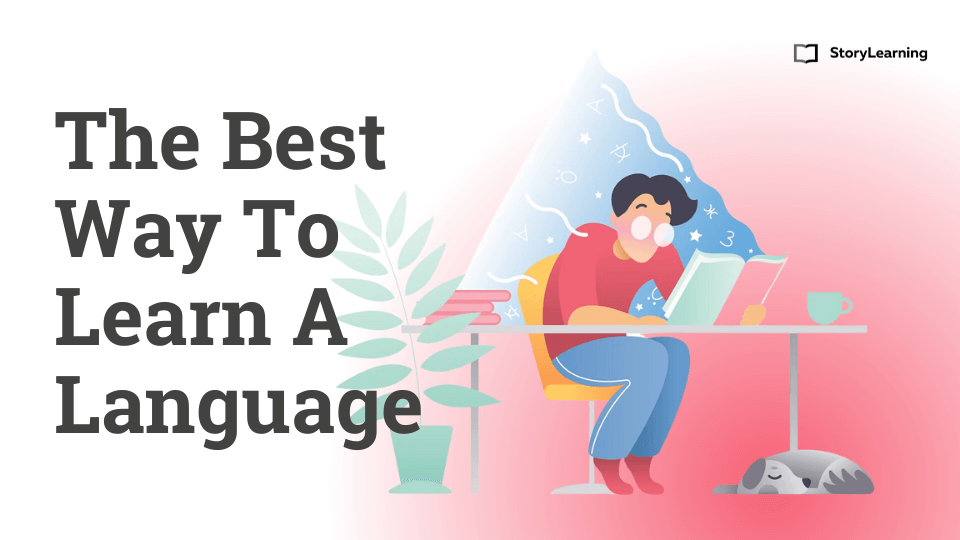
Ever wonder what's the best way to learn a new language?
With technology advancing at lightning speed, there are so many new methods and resources available to help you learn a new language.
Gone are the days of boring textbooks, evening language classes and monotonous grammar exercises.
Now, you can immerse yourself in a foreign language from the comfort of your own home with just a few clicks.
From…
- Language learning apps that make studying feel like a game
- To online lessons with tutors from around the world
- To AI chatbots you can speak to any time you like
… the possibilities are endless!
But all of this raises an important question… what is the best way to learn a language?
After all, with many possibilities, come many potential distractions!
In this article, I'll cut through the noise and tell you what I believe works.
These conclusions are based on 15+ years experience of learning languages, teaching languages, and even training teachers to teach languages!
So, whether you're looking to pick up Spanish for your next vacation or brush up on your French for that promotion at work, you'll leave ready to make the most of your language learning.
Let's dive in!
The Best Way to Learn A Language – Table of Contents
The 7 Best Ways to Learn A Language
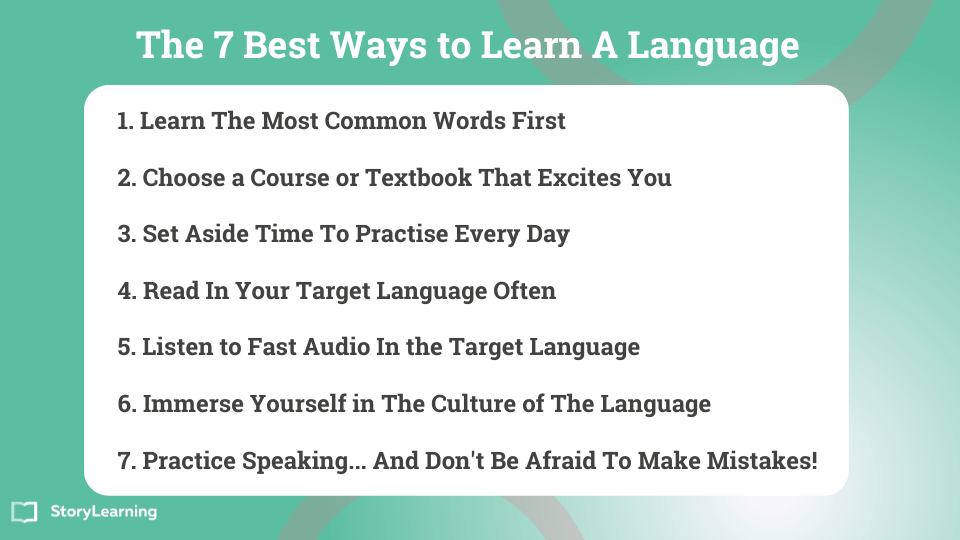
Here are 7 of the best ways to learn any language and make progress quickly…
1. Learn The Most Common Words First
You can't speak to people or understand them if you don't know any words!
So this first one is simple – learn as many of the most common words in your new language as quickly as possible.
It doesn't really matter whether you use flashcards, memory tricks or any other method. The most important thing is to get these words into your brain.
Once you've mastered your first basic words, it's easy to move on to more fun, efficient and nuanced language learning methods.
2. Choose a Course or Textbook That Excites You
When choosing resources to help you learn a language, make sure to pick something that gets you excited. This will keep you coming back to your learning every day.
Speaking of which…
3. Set Aside Time To Practise Every Day
Studying your new language regularly and consistency will be key to your success.
Those who show up and do 10 minutes every day always outperform those who do 1 or 2 hours in a block once a week.
Regular exposure to the language is essential to help it worm its way into your brain.
So if you're looking for the best way to learn another language, consistent study will be a big part of it!
4. Read In Your Target Language Often
This is one of the best ways to learn a new language because it helps you build up a big vocabulary fast.
It also allows you to master grammar naturally without resorting to rules and memorisation.
Reading is personally my favourite way to learn any language. Read to the end to find out why!
5. Listen to Fast Audio In the Target Language
Most students make the mistake of listening to slowed-down audio in courses and textbooks.
Even worse, many don't listen to the language very much at all.
This is a big reason why they never learn to understand native speakers at full speed.
The best way around this is to regularly listen to fast, native audio in your target language. Ideally, do it with a transcript so you can follow what's being said.
Over time your ear will adapt to the speed and you'll notice a big improvement in your listening comprehension.
6. Immerse Yourself In The Culture Of The Language
Staying motivated is essential if you're to stick with your new language long enough to become fluent.
Immersing yourself in the culture of the language is the perfect way to keep that motivation high. Whether it's spending time listening to Spanish music, devouring Japanese anime or learning more about French literature, connecting with culture helps keep you interested.
7. Practice Speaking… And Don't Be Afraid To Make Mistakes!
Last but not least, use what you've learned in the real world and practise speaking your new language!
Most people start learning a language because they want to speak it confidently. Yet many of us experience a fear of speaking that holds us back from making progress.
You will make lots of mistakes at first, but that's ok! Give it a go and take the opportunity to speak your new language whenever possible.
Want even more of my tips on the best way to learn a language? Check out this video where I share 17 recommendations from 10+ years of language learning and teaching experience:
How to Learn a New Language… Without Studying!
Traditionally, languages were taught with textbooks, classroom lessons and boring tests.
None of these is a particularly good approach.
Trust me. I've tried the lot.
But are modern approaches like apps and online courses any better?
Well, yes and no.
In my experience, it's not so much the resource you use that matters but the method you follow.
Most apps and courses take the traditional methods you used at school like grammar exercises, “repeat after me” and rote memorisation and wrap them up in a digital package.
It's the same ineffective approach, with just a few bells and whistles added.
But what if you don’t learn languages by deliberately studying them?
What if, instead, you learn languages by reading and listening to stories?
That's exactly how you learn a new language with the StoryLearning method.
And I believe it's the best way to learn a language if you want the experience to be both fun and successful!
The Best Way to Learn A New Language? Like A Child
The most effective way to learn a second language is the same way you learned your native language – through immersion and input. In particular, through stories.
This is a natural way of learning. It helps you think in the language and is how children learn their native languages.
It's a learning style backed up by recent research into language acquisition at major universities.
I discovered this method as an adult and I've used it ever since to help thousands of people around the world to achieve success in a new language.
But why how does this method work and why is it so effective?
Why Learn A New Language With Stories?
StoryLearning is a method that connects with humankind's oldest form of communication – storytelling.
We've been telling stories ever since we first began speaking around campfires and painting in caves.
And stories continue to be a central part of our lives today.
From gossip to news, reading books, watching films or even discussing the “narrative” of sporting encounters or political events, stories are all around us. We're hardwired to use them and to remember them.
And that's why learning with stories is the best way to learn a language.
Lessons from stories are more powerful and memorable because you can relate the stories to your own life.
And this is proven!
Scans show that brain activity from a story can last for days! This explains why what you learn from stories lasts longer than in traditional learning.
Psychologist Jerome Bruner has even suggested that we are 22 times more likely to remember facts that come from stories than those that don't.
How Stories Help You Learn A Language Fast

When you learn another language with stories, the results are mind-blowing.
Here are just a few of the reasons I believe that stories are the best way to learn a language fast:
| Why StoryLearning Is The Best Way To Learn A Language | |
|---|---|
| Remember New Words Easily | Because your brain sees new words and phrases in context vocabulary learning is much easier when you practise with stories. |
| Master Grammar Naturally | When you see the same grammar being used over and over in a story, your brain begins to understand how it works. Instead of learning rules, you simply get used to how grammar works from the story. This is how you learn grammar fast and make it stick forever in your brain. |
| Comprehension Comes Effortlessly | In my StoryLearning courses, I always encourage simultaneous listening and reading. This helps you to quickly develop a strong understanding of the spoken language as well as being able to read it. |
| Stories Keep You Motivated | I don't know about you, but I'd much rather enjoy a story than read a boring old textbook. Stories keep you coming back for more, which motivates you to study every day. |
With the deep, native-like knowledge you get from the StoryLearning method, you can learn any language faster. This is why it's one of the best ways to make progress fast.
I currently help students from around the world to learn 15+ languages with this method through my online courses and books.
Curious to try it out?
You can test out the StoryLearning method yourself with a 7-day free trial of my popular courses.
Language Learning Apps Are NOT The Best Way to Learn Any Language
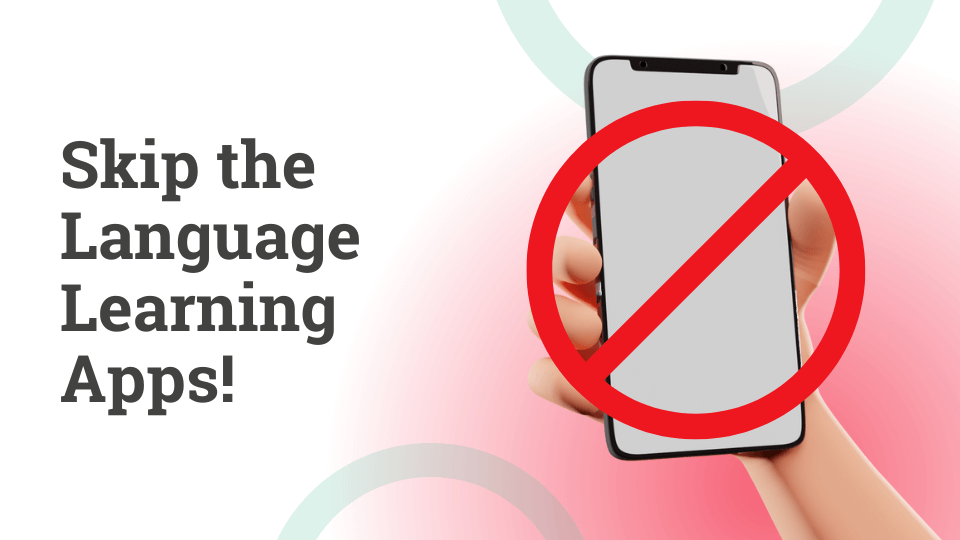
Unpopular opinion alert!
Lots of people try to learn their target language with apps.
I understand the appeal.
After all, what's not to like about learning a language effortlessly on your phone and becoming fluent in just a few minutes a day?
The problem is that apps offer a very surface-level learning experience.
There's no depth to them. No connection.
As we've seen, it's the depth, the connection and the story that make learning more memorable, and therefore more effective.
This is why it's not unusual to meet people who have year-long “streaks” on a language app but can hardly order a drink in their target language. They're unable to use the language in the real world.
They've learned everything out of context, instead of mastering new vocabulary and grammar naturally the way native speakers do.
If you want to learn a language and really fast progress, language learning apps are not the answer.
They might be fun, but they're not the best way to learn a language.
Stories beat apps every time because they allow for deep learning.
Language learners who study with stories build vocabulary faster and even perform better on grammar tests than those who learn with apps and rules.
Ready to try out this revolutionary story-based approach for yourself? Why not get started now with a free 7-day trial of our StoryLearning courses?
There are over a dozen languages available to choose from!
Short On Time To Learn Another Language?
Are you trying to learn a language whilst holding down a full-time job?
Does your free time get eaten up by family commitments, leaving you little time or energy to devote to language learning?
You're not alone. So what is the best way to learn a language if you're short on time?
Finding the best way to learn a language when you're always up against it, is the number one problem faced by language learners today.
But I have some good news for you.
With a small change in mindset, you can quite easily fit a solid, effective routine into even the busiest schedule, that will have you learning a language and speaking fluently quicker than you ever thought possible.
You see, it's not your time that's the problem (although I know it seems that way). The problem is how you view what's possible in that time.
Tips for Learning A Foreign Language When Even When You're Busy
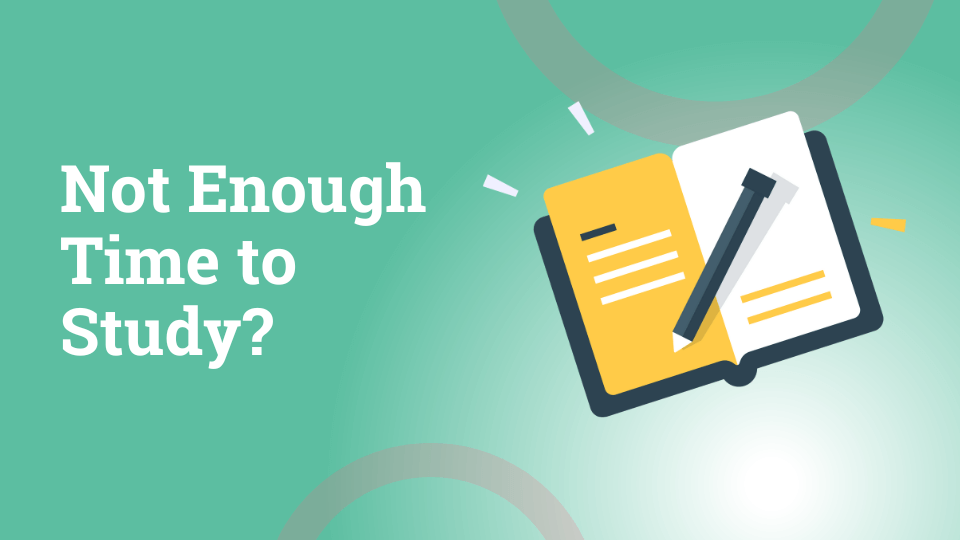
Lots of people learn new language skills even with busy schedules. I've done it myself!
Here are a few of my top tips for effective language learning when you're short on time…
Tip #1: Choose The Right Language Learning Programs
Choosing the right language learning program is the first key to making the most of your language learning time.
Lots of people try to study with apps or even just by watching Netflix in their target language. This isn't very effective!
You need to really understand whether the language learning activities you do every day are actually helping you reach your goals, or leading you down a dangerous path of time-wasting and procrastination.
This is why I recommend starting with a trusted and well-structured online course.
A good course will be designed so you always know exactly what to do next and the lessons will be arranged into manageable chunks so that whether you have 10 minutes or 2 hours for learning each day, you're always able to make progress.
This is something my team and I spend a lot of time working on when designing our StoryLearning courses.
Besides choosing the right course, it's also essential to know how to learn so you can be efficient with what little time you have to learn another language.
Tip #2: Focus, Focus, Focus

Before you start studying, you need to be clear on exactly what you're going to focus on if you want to become fluent any time soon.
It's essential to your success!
Before diving into a new course, take a few minutes to write down your language learning goals.
This is a pattern I've noticed with all good language learners and it will help you stay motivated and focused for the months to come.
Tip #3: Plan A Consistent Language Learning Routine
If you want to achieve fluency in a language, it's going to take time. You'll need to develop a good routine and apply it consistently to reach your goals.
I spent years learning how to structure my language learning routine, to ensure I could stick to it and make it as efficient as possible. Here are a few insights into what I've learned from 20+ years of experience:
- Sample language learning routine
- Sticking to routines – what I wish I knew 10 years ago
- 8 study hacks you can use when you're too busy to learn a language
Tip #4: Look For Ways To Make Your Study Time More Efficient
Mastering a new language isn't just about the hours you put in. A big factor in your success will be how well you use that time!
Experienced language learners can often learn more in half the time because they've developed “hacks” to help them learn faster. Check out this article on how to do 1 hour's study in only 5 minutes for more on how to apply this in your own learning!
The Best Way to Learn A Language? StoryLearning!
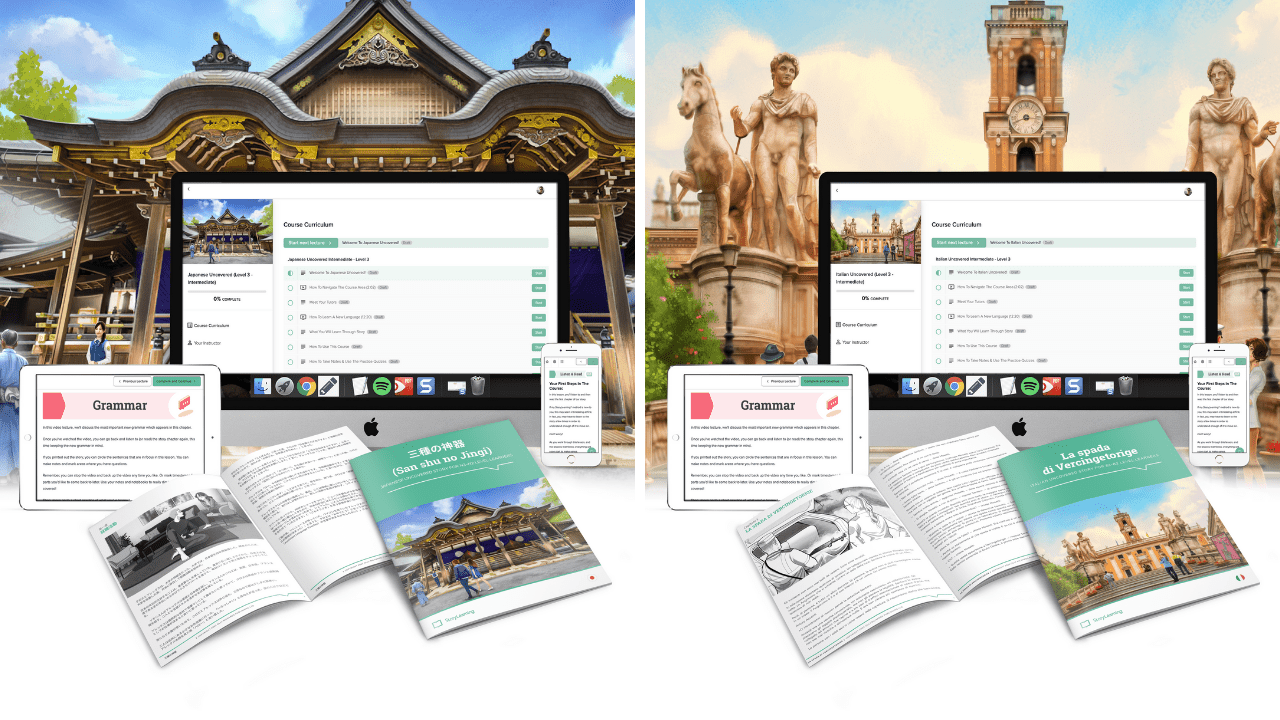
Learning a new language can be a challenging experience but it's also very rewarding.
There are lots of different methods and tools to learn a second language from language exchanges and apps to classroom lessons.
But the best method for learning a new language quickly is through natural immersion in fun, engaging stories.
This is a method that is based on the way we all learn our native languages as children. It allows us to pick up new vocabulary naturally and deeply ingrain grammar in our brains – no rules required!
Whichever language you want to learn, stories can help you get fluent in a fun and fast way.
But the most important step of all is to get started.
And with StoryLearning you can get started today for free. Click here to take a 7-day free trial of our online courses and see just how easy it can be to learn a new language with stories.
I look forward to seeing you on the inside!









































